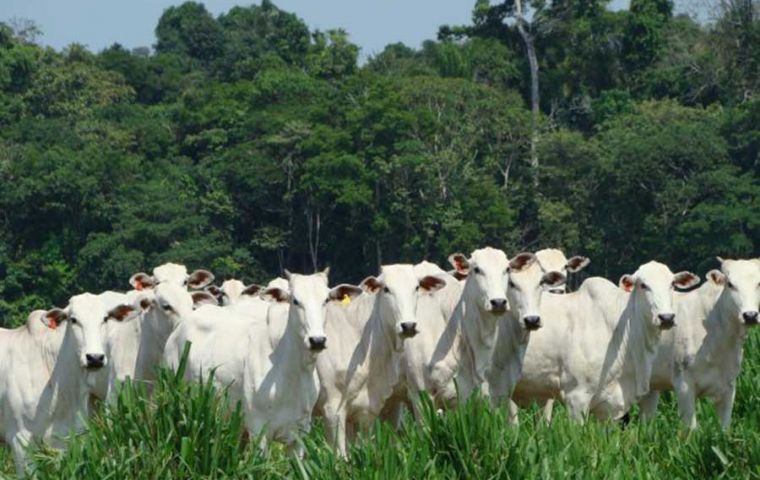MercoPress. South Atlantic News Agency
Brazilian beef industry ready to fight EU deforestation law scheduled to become effective December 30
 Brazil has a traceability protocol to export to EU; the SISBOV system mandates individual identification and monitoring of cattle at least 90 days before slaughter
Brazil has a traceability protocol to export to EU; the SISBOV system mandates individual identification and monitoring of cattle at least 90 days before slaughter As the deadline for the implementation of the European Union anti deforestation law, scheduled for next December 30, (even when it could be delayed), the powerful Brazilian cattle and meat industry is working on the presentation of a pilot traceability and monitoring project for the supply chain to present to the EU.
Currently, Brazil follows a specific traceability protocol to export beef to the EU. The SISBOV system mandates individual identification and monitoring of cattle at least 90 days before slaughter, and that they remain on the certified property for 40 days prior to shipment to the slaughterhouse. However, the EU’s anti-deforestation law requires traceability from the animal’s birth.
The proposal from the Brazilian Beef Exporting Industry Association (ABIEC) suggests that cattle up to 13 months old, acquired for fattening by certified properties and tracked through Animal Transit Guides (GTA), should be considered eligible for meat export. This is because, generally, cattle of this age have only passed through one farm before moving to a fattening property.
“The issue is not entirely resolved, as not 100% of the properties would meet this requirement. However, with the help of certifiers already involved in the process, we could use the GTA to trace back and verify if the previous property where the animal was kept also meets the anti-deforestation requirement,” said Danielle Schneider, traceability coordinator at ABIEC, during a cattle traceability event organized by IMAFLORA in Cuiabá, Matto Grosso..
The goal, she noted, is to “save” as much of the current stock of cattle being fattened on certified properties as possible. According to ABIEC, Brazil has 1,200 properties certified to sell cattle for beef supply to the EU, with a total stock of 6 million animals. “This doesn’t mean that these animals are ready for slaughter; it only indicates that they are registered in the SISBOV database. We don’t have information about their age,” she added.
Ms. Schneider mentioned that the idea is in its early stages of discussion with the Brazilian Confederation of Agriculture (CNA) and European certifiers, aiming to test it as a pilot project in 2025, relying on a possible postponement of the new law’s implementation.
Proposed by the European Commission, the EU’s executive branch, the postponement is seen as likely by the sector. At the Salon International de l’Agroalimentaire (SIAL) in Paris, a source told Brazilian media that the fact the commission itself proposed the delay indicates it is likely to be approved by the European Parliament.
Data from Serasa Experian, presented at the event in Cuiabá, indicates that approximately 5% of the properties currently certified for export to the EU would be unable to comply with the new law. The assessment was based on territorial criteria, specifically whether deforestation occurred after December 2020. Traceability was not considered in this evaluation.
ABIEC noted that the average weaning age for calves in Brazil is around seven months. The information gathered by the association from certifiers indicates that most of the animals registered in the database for export to the EU are up to 13 months old. “This allows us to inform Europe that, throughout the animal’s life, it has only passed through two properties, both of which have been environmentally assessed to meet the necessary compliance,” Ms. Schneider said.
Brazil has become the world’s leading exporter of beef dominating some 30% of global sales. The country has a cattle head of 232 million head, with an annual production of over ten million tons of beef and 2.5 million of exports in 2023.




Top Comments
Disclaimer & comment rulesCommenting for this story is now closed.
If you have a Facebook account, become a fan and comment on our Facebook Page!